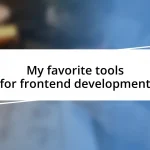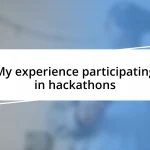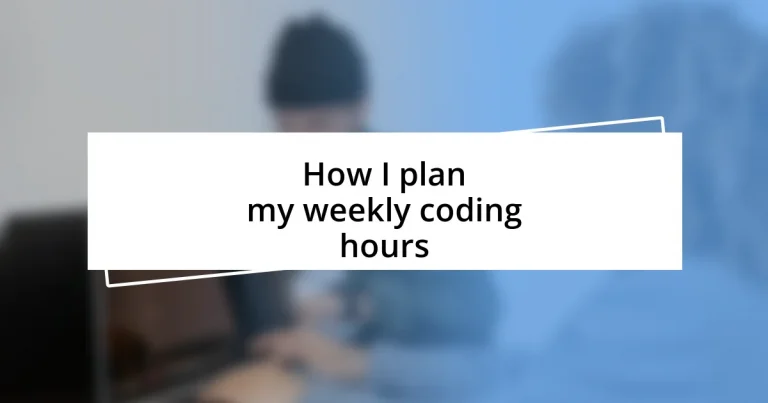Key takeaways:
- Setting clear coding hour goals transforms chaos into clarity and enhances motivation through emotional connection to objectives.
- Identifying peak productivity times enables more effective coding, with early mornings noted as the most focused period.
- Reflecting on weekly outcomes fosters continuous improvement by analyzing successes and challenges, which guides future adjustments.
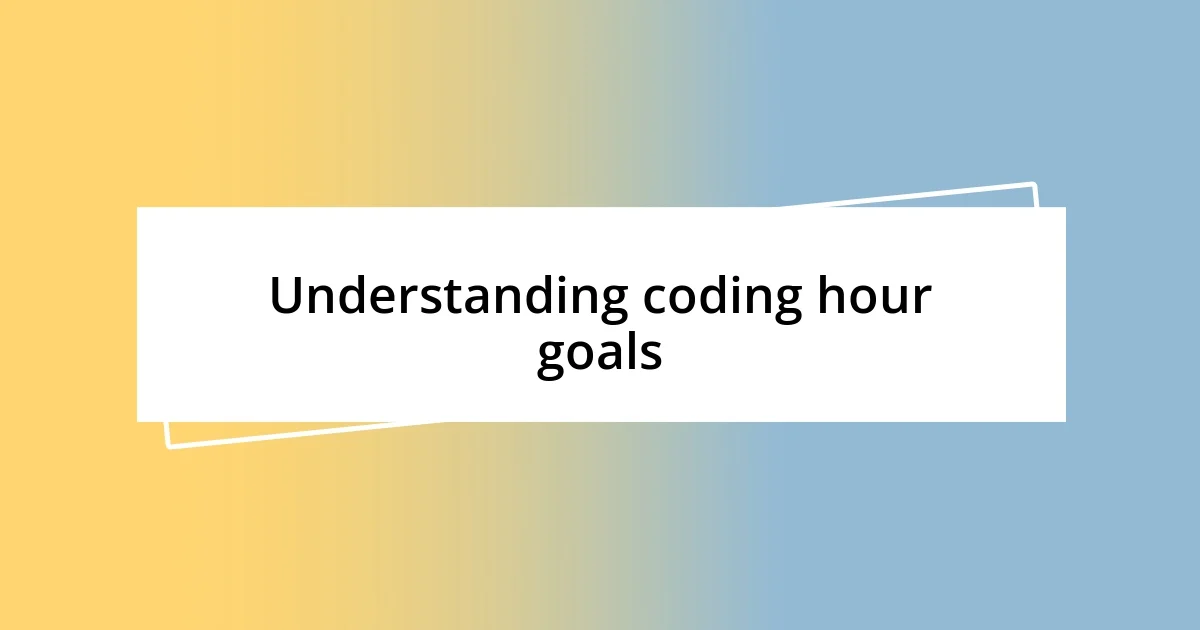
Understanding coding hour goals
When I first started coding, I didn’t fully understand the importance of setting clear coding hour goals. I remember feeling overwhelmed, trying to cram too much into my schedule without a coherent plan. Have you ever felt like you were spinning your wheels, not making any real progress? That’s where having definite goals comes in—it transforms chaos into clarity.
Establishing my coding hour goals requires reflection on what I truly want to achieve. Whether it’s mastering a new programming language or completing a project milestone, I find it helps to visualize these goals. I often ask myself what specific outcomes would make me feel accomplished at the end of the week. This emotional connection to my coding objectives not only motivates me but also makes each hour of coding feel more purposeful.
I’ve learned that flexibility is key; life happens, and sometimes my plans get derailed. For instance, I remember a week when unexpected family commitments cut into my coding time. Instead of getting frustrated, I adjusted by setting shorter, more manageable coding goals for that week. Have you ever had to adapt your plans? Embracing this adaptability can turn potential setbacks into opportunities for growth.
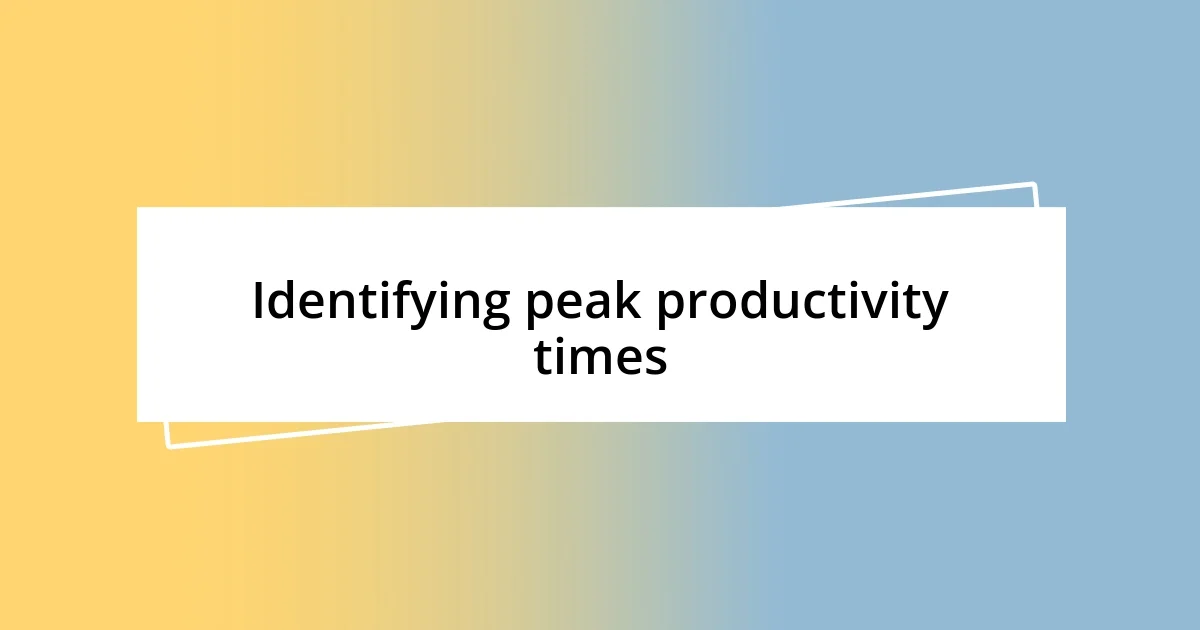
Identifying peak productivity times
Identifying when I’m most productive has been a game changer in my coding journey. I noticed that my focus sharpens significantly in the early mornings, which is quite astonishing. Have you ever experienced that rush of creativity before the world wakes up? For me, those quiet hours allow for uninterrupted thought processes, making complex problems feel more manageable.
Through some trial and error, I compared different times of the day. I’d track my productivity on a simple spreadsheet, noting when I felt the most engaged. Interestingly, I discovered mid-morning sessions also suit me well, especially after a good breakfast. It’s fascinating how we all have our unique rhythms, and recognizing mine has led to breakthroughs in my work. Do you keep track of your most productive times? I found that self-awareness not only boosts efficiency but also enhances my passion for coding.
Reflecting on my experiences, it became clear that life’s distractions tend to peak in the evenings for me, making it less than ideal for coding. I’ve had evenings where I sat in front of my screen, my mind wandering to household chores instead of coding lines. Knowing this, I strategically reserve later hours for activities like reviewing code instead of tackling new concepts, making my time more productive.
| Time of Day | Productivity Level |
|---|---|
| Early Morning | High |
| Mid-Morning | Moderate to High |
| Afternoon | Variable |
| Evening | Low |
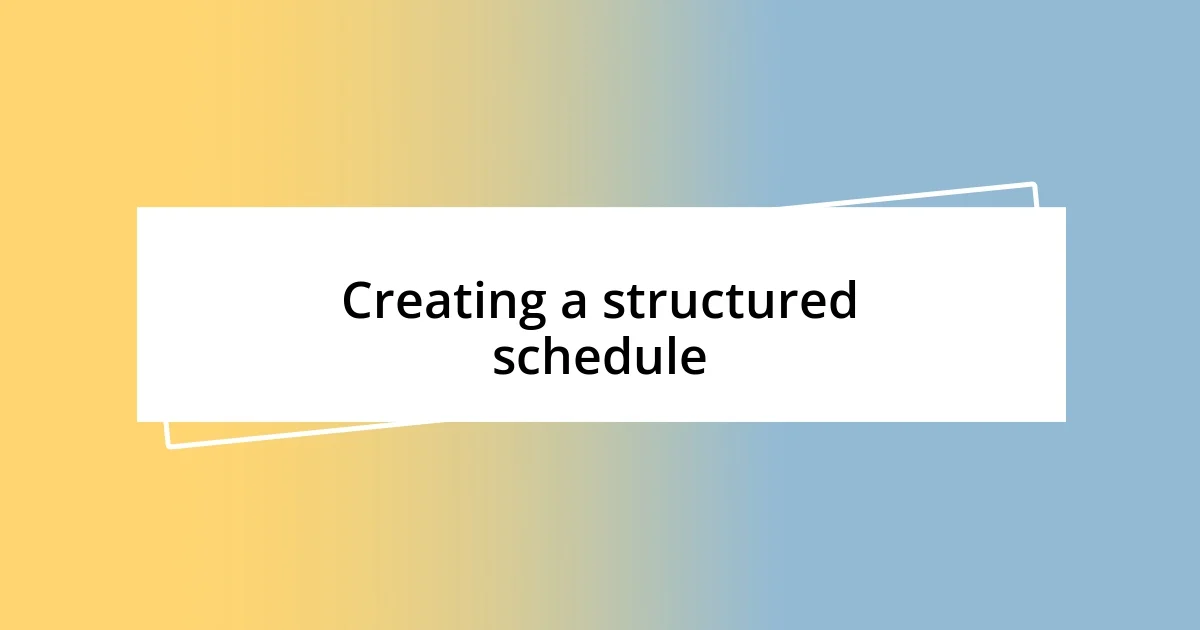
Creating a structured schedule
Creating a structured schedule is all about finding what truly works for you, and that starts with simplicity. I begin each week by blocking out dedicated coding times in my calendar. It feels empowering to see my time mapped out; I experience less anxiety and more focus. I like to make it a ritual—my own little appointment with creativity! This isn’t just about filling up hours but rather ensuring each coding session aligns with my goals.
- I allocate time slots based on my high-energy periods.
- I break larger projects into smaller tasks for a clearer path forward.
- I incorporate breaks—these keep my mind fresh and prevent burnout.
- I review my weekly plan every Sunday evening, giving me a chance to adjust and prepare mentally.
Sometimes, I get spontaneous bursts of inspiration, and I’ve learned to embrace those. If an idea sparks in the middle of a scheduled task, I give myself permission to explore it. This way, I maintain a sense of excitement and creativity throughout my week, blending structure with a bit of freedom. Have you ever noticed how those unplanned sessions can lead to the most innovative solutions?
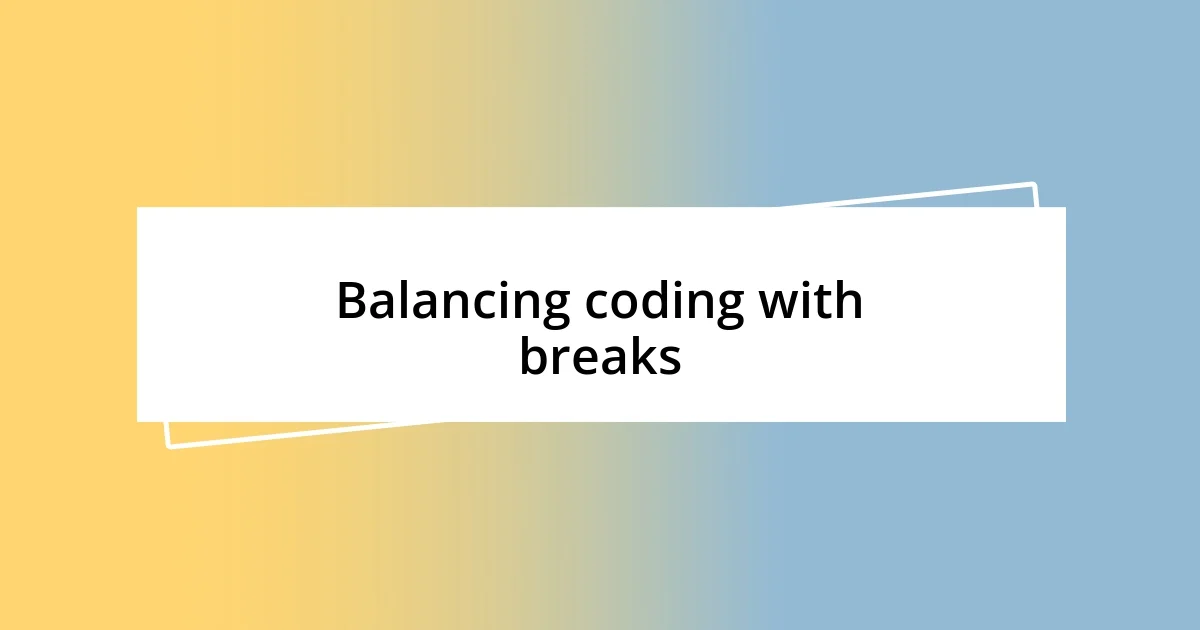
Balancing coding with breaks
Finding the right balance between coding and taking breaks feels like an art form to me. I usually set a timer for focused coding sessions, typically lasting about 25 to 30 minutes, followed by a 5-minute break. It’s during these short respites that I often step away from my desk to stretch or grab a glass of water. Have you ever realized how just a moment of physical movement can clear your mind? For me, it’s refreshing, and I return to my screen feeling re-energized, ready to tackle the next line of code.
On days when I’ve pushed myself too hard without pausing, I’ve noticed a decline in my creativity. It’s like trying to force a river to flow when it prefers a gentle curve. I remember one particularly frustrating afternoon when I spent hours glued to my laptop, convinced I needed to power through. Instead of breakthroughs, I encountered headaches, and my productivity plummeted. That experience taught me the value of pacing. Do you also struggle with the temptation to keep coding? Now, I make sure to schedule longer breaks—like a walk outside or time with a good book—that allow me to refocus throughout the day.
Interestingly, I’ve also discovered that the nature of my breaks can dramatically impact my coding sessions. If I spend my break mindlessly scrolling on social media, I often feel more drained afterward. Instead, I’ve started to engage in activities like practicing mindfulness or listening to a few tracks of soothing music. This intentional break practice not only clears my mind but also enhances my creativity. Have you found specific activities that fuel your motivation? Balancing coding with break times is all about the quality of those breaks, and I cherish every moment that helps recharge my creative spirit.
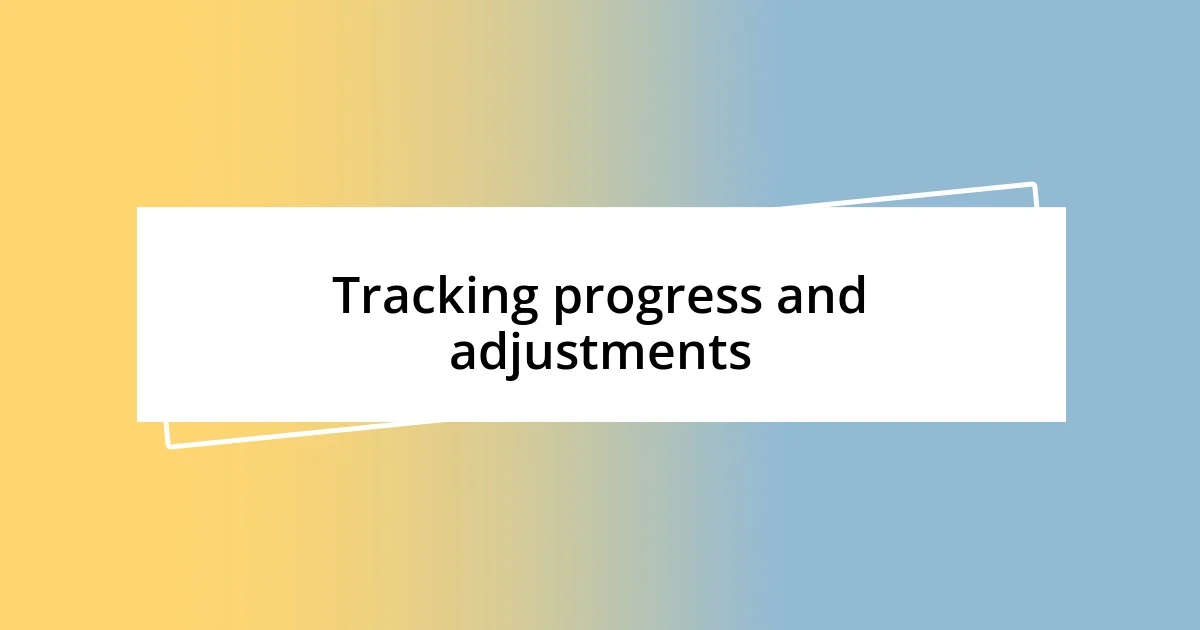
Tracking progress and adjustments
Tracking my progress is a key part of my weekly coding ritual. I make it a habit to jot down what I accomplished at the end of each session. Reflecting on my successes feels rewarding, while reviewing my challenges allows me to strategize how to tackle similar obstacles in the future. Have you ever looked back at your week and experienced that “aha” moment? It’s both humbling and motivating to recognize where I’ve grown, and that always fuels my next steps.
Adaptability is essential for progress. I’ve learned that sticking rigidly to my plan can sometimes hinder my creativity. For instance, there was a week when I found myself getting stuck on a coding problem; I felt frustrated and was ready to give up. Instead of forcing my way through, I decided to shift focus to a different task that had been lingering on my to-do list. This change not only reignited my motivation but also led me to discover new solutions later on. Have you ever found that stepping back can give you fresh insight?
Tracking my coding hours also involves a bit of analysis. I use tools like time trackers to visually represent how my hours are spent, which has opened my eyes to patterns and inefficiencies. One time, I realized I was dedicating too much time to debugging, which was draining my energy. By adjusting my schedule to include more time for planning, I was able to approach coding with greater clarity and intention. How do you see your time? Identifying those patterns has transformed my workflow, ensuring I enjoy every minute spent coding.
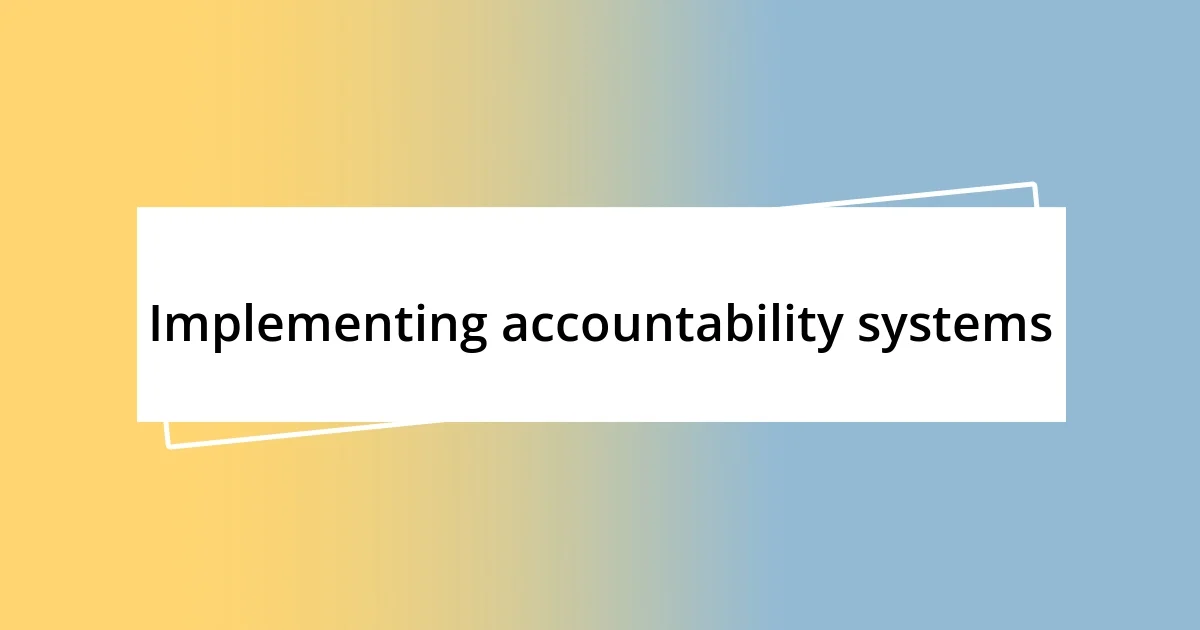
Implementing accountability systems
Implementing accountability systems has been a game changer for my coding routine. I remember the time I joined a coding group where we shared our weekly goals and progress. We kept each other in check, which not only motivated me but also created a sense of camaraderie. Have you ever felt the drive that comes from knowing someone is rooting for you? I still make it a point to update my group every week, and it pushes me to complete my tasks even when my motivation wanes.
In addition, I’ve started using a dedicated app to track my commitments and milestones. It’s fascinating how setting reminders and deadlines can turn into a productive ritual for me. Just last month, I had a looming project deadline that seemed daunting at first. By breaking it into smaller tasks in the app, I was able to visualize my progress. Isn’t it amazing how clear goals can transform anxiety into a structured path? Those little checkmarks are like mini-celebrations along the journey.
Peer accountability doesn’t stop with group updates. I often find a coding buddy and schedule regular sessions to work side by side, even if we’re remote. There’s something energizing about knowing someone else is coding alongside you, even if it’s through a screen. Did you know that a shared environment fosters focus and creativity? I’ve noticed I’m less prone to distractions when I can see my buddy deep in thought. It’s these connections and systems that hold me accountable and keep my passion for coding alive, shaping my weekly plans in a fun and engaging way.
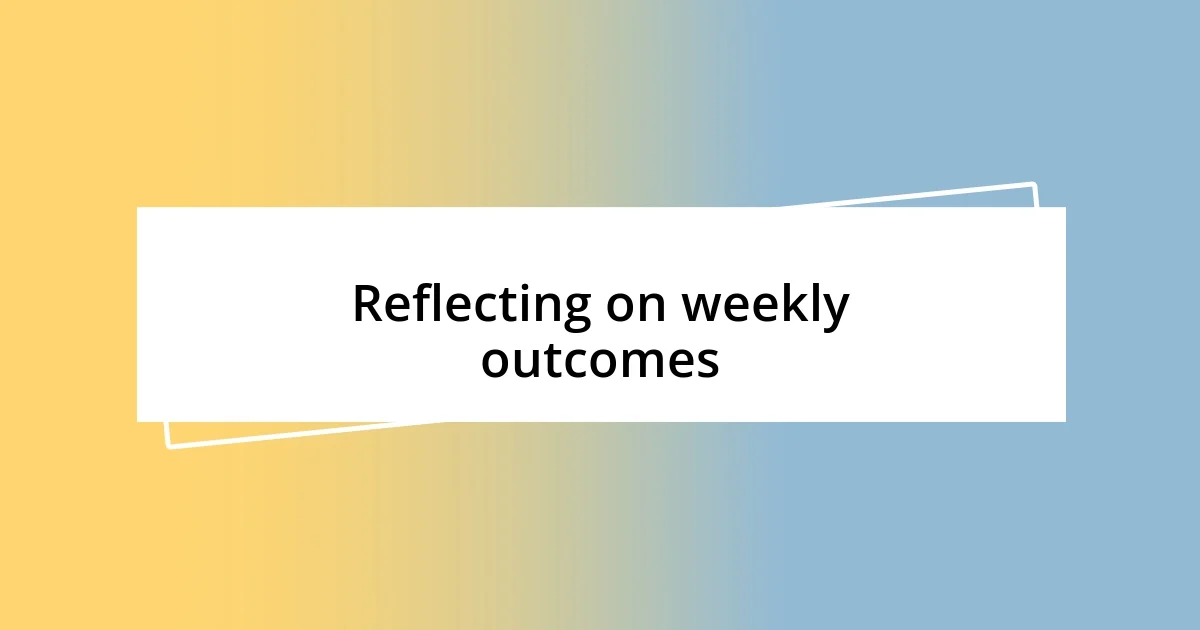
Reflecting on weekly outcomes
Reflecting on my weekly outcomes is a practice I truly cherish. I like to set aside some quiet time, often with a cup of coffee, to review what I achieved and the challenges I faced. Last week, I had a breakthrough with a particularly stubborn piece of code, and revisiting that moment helped me appreciate my persistence. Have you ever felt that rush of pride when you recall how you conquered a problem?
When I analyze my weekly progress, I focus on both tangible results and emotional responses. For instance, I once spent an entire weekend diving deep into a project, only to find that I had overlooked a simple mistake that cost me time. Reflecting on this, I realized that it wasn’t just about the hours I put in but also about the quality of my focus and energy. Isn’t it eye-opening to recognize how our mindset can influence our productivity and ultimately shape our success?
The beauty of this reflection process is that it fosters continuous improvement. With every week, I take notes on what worked and what didn’t, which essentially serves as a roadmap for my next steps. Just last month, I discovered that splitting my coding sessions into shorter bursts enhanced my concentration. It’s all about finding that sweet spot, right? How do you adjust your approach when things don’t go as planned? Understanding my personal rhythms has empowered me to make thoughtful adjustments, turning setbacks into stepping stones for greater success.


